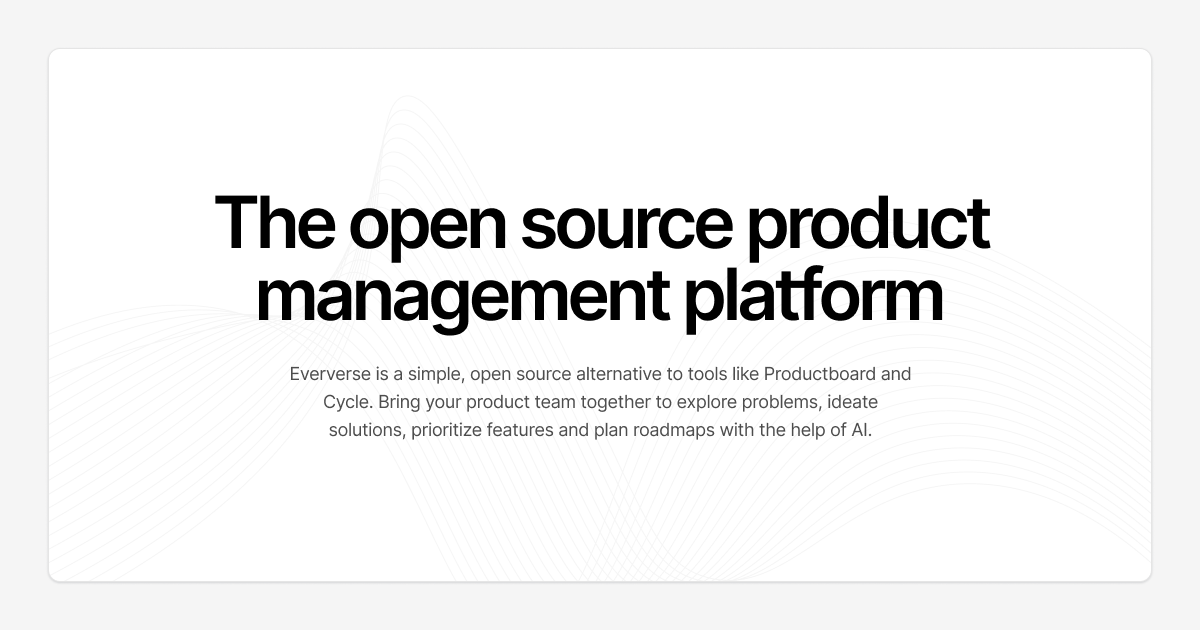
Table of Contents
Overview
In the ever-evolving world of product management, finding the right tools to streamline workflows and foster collaboration is crucial. Enter Eververse, an open-source product management platform designed to unify product teams around the core pillars of product development: problem exploration, solution ideation, feature prioritization, and roadmap planning. With its built-in AI assistance and modern, lightweight approach, Eververse offers a compelling alternative to legacy solutions, promising a more agile and insightful product development journey. Let’s dive into what makes Eververse a contender in the crowded product management space.
Key Features
Eververse boasts a range of features designed to empower product teams:
- Open-source architecture: Provides unparalleled customization and integration possibilities, allowing teams to tailor the platform to their specific needs.
- AI-assisted product planning: Leverages artificial intelligence to synthesize feedback, identify trends, and support data-driven decision-making throughout the product lifecycle.
- Collaborative workspace: Fosters seamless communication and teamwork, enabling product teams to brainstorm ideas, share insights, and align on strategic goals.
- Feedback aggregation: Centralizes user feedback from various sources, providing a comprehensive view of customer needs and pain points.
- Feature prioritization tools: Offers a range of prioritization frameworks to help teams identify and focus on the most impactful features.
- Roadmap creation modules: Simplifies the process of creating and managing product roadmaps, ensuring alignment and transparency across the organization.
How It Works
Eververse simplifies the product development process by providing a centralized platform for all key activities. Teams begin by collecting feedback from users and stakeholders, which is then aggregated within the platform. Next, teams brainstorm ideas and explore potential solutions, leveraging Eververse’s collaborative workspace. The AI then steps in to help synthesize the collected feedback into actionable insights, highlighting key trends and opportunities. Finally, teams use the feature prioritization tools to determine which features to focus on and create a comprehensive roadmap to guide development. The open-source nature of Eververse allows teams to customize the platform and integrate it with their existing workflows, further streamlining the process.
Use Cases
Eververse is particularly well-suited for:
- Startups: Offers a fast and flexible solution for roadmap creation, allowing startups to quickly adapt to changing market conditions.
- Product teams: Provides a structured environment for ideation and planning, ensuring that all team members are aligned on strategic goals.
- SaaS companies: Enables continuous feedback loop integration, allowing SaaS companies to continuously improve their products based on user feedback.
- Agile organizations: Supports feature prioritization and sprint alignment, helping agile teams deliver value quickly and efficiently.
Pros & Cons
Like any tool, Eververse has its strengths and weaknesses. Let’s take a look:
Advantages
- Open-source and customizable, offering unparalleled flexibility.
- Lightweight and easy to adopt, minimizing the learning curve.
- AI-assisted insights, providing data-driven support for decision-making.
Disadvantages
- Still developing ecosystem, meaning fewer integrations and community support compared to established platforms.
- Requires setup for full capabilities, potentially requiring technical expertise.
- May lack some enterprise-grade features, making it less suitable for very large organizations with complex needs.
How Does It Compare?
When considering product management tools, it’s important to understand how they stack up against the competition. Here’s a brief comparison:
- Productboard: While comprehensive, Productboard can be complex and costly, making Eververse a more accessible alternative for smaller teams.
- Cycle: Cycle excels at user feedback management but lacks the flexibility and strategic depth of Eververse.
- Trello: Trello is great for task tracking but lacks the product strategy depth needed for comprehensive product management, where Eververse shines.
Final Thoughts
Eververse presents a compelling option for product teams seeking a modern, lightweight, and customizable product management platform. Its open-source nature and AI-assisted features offer a unique blend of flexibility and intelligence. While the developing ecosystem and setup requirements may present challenges for some, the potential benefits of streamlined workflows and data-driven decision-making make Eververse a tool worth considering. As the platform continues to evolve, it’s poised to become a major player in the product management landscape.

